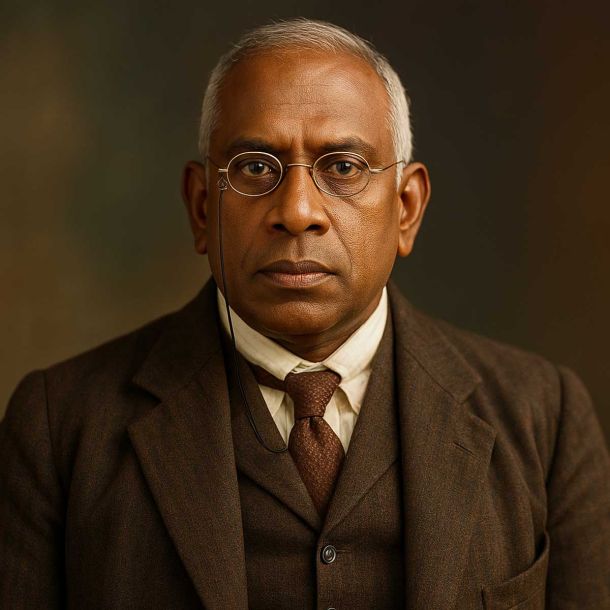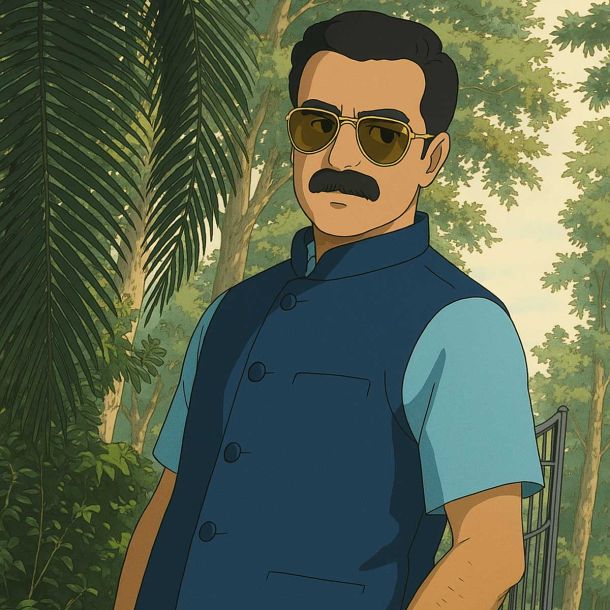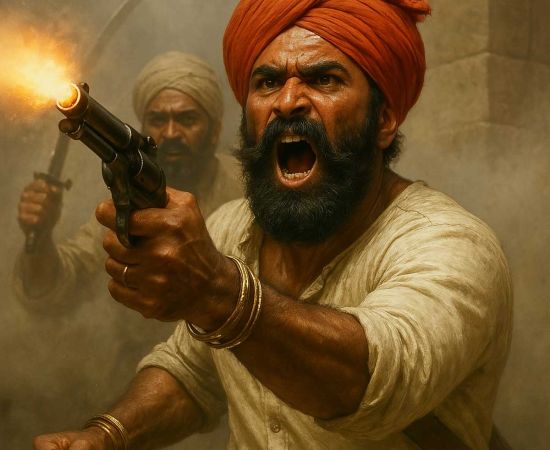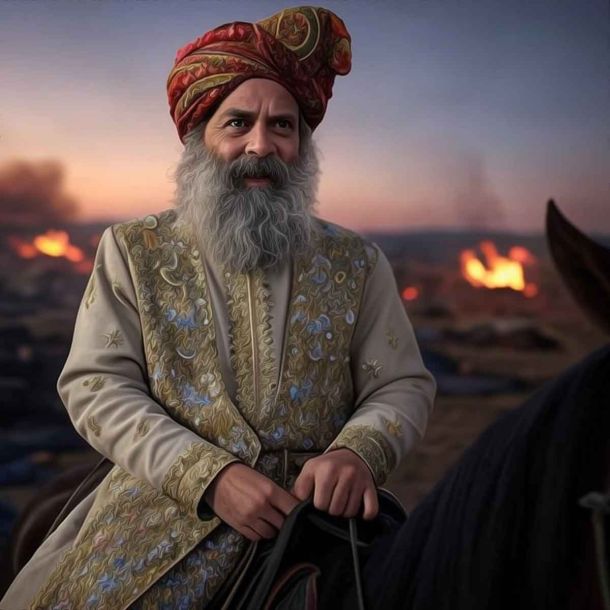MORE COVERAGE
Twitter Coverage
Satyaagrah
Written on
Satyaagrah
Written on
Satyaagrah
Written on
Satyaagrah
Written on
Satyaagrah
Written on
JOIN SATYAAGRAH SOCIAL MEDIA
Unearthing a disturbing saga in Uttar Pradesh where a Hindu girl, kidnapped, subjected to sexual abuse, force-fed beef, and was forcibly converted to Islam, police launched a case against Shoaib, Najma Khan, Aqib, Reshma and Mehraj along with five others
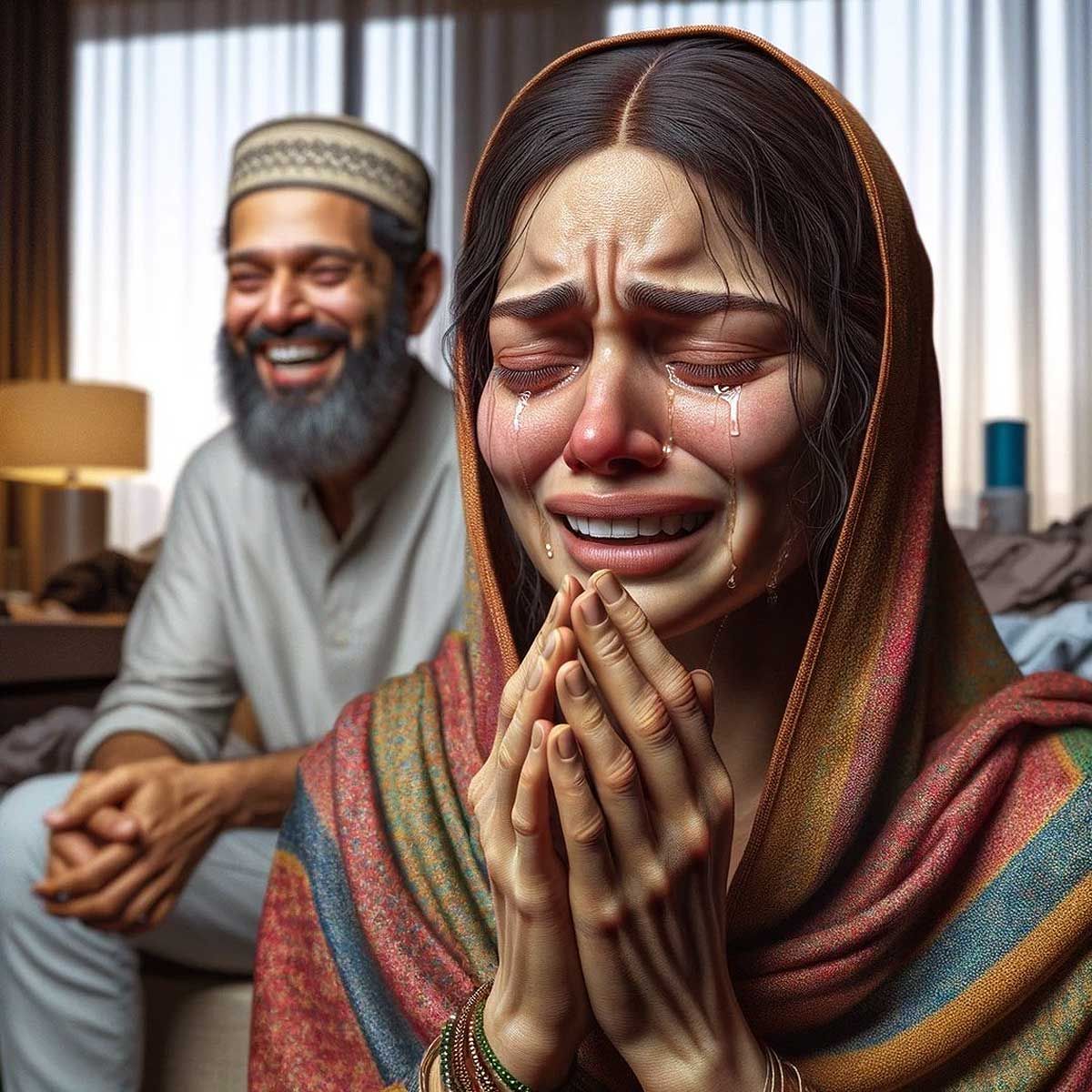
In a distressing incident that has shaken the community in the Hardoi district of Uttar Pradesh, a case of alleged love jihad has emerged, centering around the forceful conversion of an 18-year-old Dalit girl to Islam by a man identified as Shoaib. The victim's father, grappling with the trauma inflicted upon his daughter, revealed disturbing details of her ordeal, including instances of sexual abuse and the force-feeding of beef. These harrowing revelations have sent shockwaves through the region, prompting authorities to take immediate action.
|
The victim's father, a distraught man seeking justice for his daughter, bravely spoke out about the horrendous experiences she endured. According to him, the 18-year-old was not only subjected to forceful religious conversion but also fell victim to sexual abuse. The gravity of the situation is further intensified by the revelation that the young girl was coerced into consuming beef against her will. These revelations cast a stark light on the disturbing tactics employed in the alleged love jihad case, leaving the community in disbelief.
As news of this shocking incident broke, authorities swiftly responded by registering a case on December 4. The wheels of justice are now in motion as an investigation is underway to unveil the full extent of the atrocities committed against the young victim. The local police, sensitized to the gravity of the situation, are leaving no stone unturned to ensure a thorough and unbiased inquiry.
What adds another layer of complexity to this distressing narrative is the involvement of women as alleged perpetrators. The recognition of women playing a role in such cases challenges conventional perceptions and raises questions about the dynamics at play. The investigation will likely delve deeper into understanding the motives and roles of all those involved, bringing to light the intricate details of a case that has not only scarred an individual but has broader implications for societal harmony.
In the face of such disturbing revelations, the community in Hardoi is left grappling with the shock and anger stemming from the alleged love jihad incident. The urgency of addressing the complexities surrounding this case cannot be overstated, as it not only reflects an individual tragedy but also raises concerns about the larger issue of religious conversions and their potential misuse. The coming days will undoubtedly shed more light on the investigation, providing answers and, hopefully, justice for the victim and her family.
This distressing incident, emblematic of alleged love jihad, unfurled its dark tendrils in a village nestled within the confines of the Sursa police station neighborhood in the Hardoi district. The poignant narrative, emanating from this quiet corner of Uttar Pradesh, serves as a stark reminder of the vulnerability that persists in the face of such heinous crimes.
|
The accused, hailing from the Firozabad district, executed his sinister plan on 17 June, abducting the innocent girl from Sonepat. Sonepat, a city in Haryana, served as an unsuspecting backdrop to the unfolding tragedy. The victim's father, a hardworking individual laboring in a factory within the Sonepat district, had migrated to this region in pursuit of livelihood and sustenance for his family.
As the accused strategically executed the abduction from a district distant from the familial roots, the victim's family was plunged into a frantic search for their beloved daughter. The failed attempts to locate her heightened the anguish and despair experienced by the family, emphasizing the deeply emotional toll exacted by such crimes on the kin of the victim.
The victim's father, a laborer toiling in a factory in Sonepat, found himself caught in the intricate web of this tragedy. His migration in pursuit of a livelihood now juxtaposed with the heart-wrenching ordeal his family faces, raising questions about the safety and security of individuals who relocate for better opportunities. The connection between economic aspirations and the vulnerability of individuals in unfamiliar territories becomes glaringly evident in the face of such a distressing incident.
|
In a turn of events laden with despair, the 18-year-old victim managed to break free from the clutches of her tormentor, returning to her Hardoi hamlet on December 3. Her solitary return marked the beginning of a courageous revelation, exposing the brutalities she endured during her harrowing days in captivity.
The survivor recounted a chilling tale of abduction and coercion, detailing the journey that led her to Firozabad, a place etched in her memory as the site of her forced conversion to Islam. The distressing revelation that she was compelled to embrace a religion against her will, coupled with the heinous act of being forced to consume beef, adds a layer of horror to the unfolding narrative. These revelations underscore the blatant violation of her basic rights, the erosion of personal autonomy, and the profound trauma inflicted upon her.
The sinister plot took a more sinister turn as the accused, Shoaib, forced the victim into a marital alliance against her wishes. The forced marriage, a glaring violation of her agency, was followed by an act of sexual violation. This sequence of events paints a grim picture of the extent to which the victim was subjected to not only physical but also psychological abuse, amplifying the gravity of the alleged love jihad case.
|
Shoaib's involvement extended beyond himself as his entire family became complicit in subjecting the young girl to a harrowing ordeal of both physical and mental torture. The collective responsibility of the family in perpetrating these crimes raises questions about the societal structures that enable such actions to occur. The survivor's revelation shines a light on the need for a comprehensive approach to address the multifaceted dimensions of crimes, involving not only the perpetrators but also those who enable and support such acts.
The girl, resilient in the face of adversity, seized an opportunity on December 3 to escape the clutches of her tormentors. Her journey led her to her aunt's (mother's sister) house, where she found a temporary sanctuary before mustering the strength to return to her village. The significance of seeking solace in familial bonds during times of crisis is evident, underscoring the importance of a support system in the aftermath of traumatic experiences.
Upon her return to the village, the survivor bravely narrated the entire ordeal to her family, breaking the silence that often shrouds victims of such crimes. Her courageous act not only exposes the dark underbelly of the alleged love jihad case but also serves as a catalyst for justice, igniting a collective call for accountability and redress. The survivor's journey from captivity to liberation is a testament to the resilience of the human spirit and the imperative of dismantling systems that perpetuate such atrocities.
When the girl who had been through a terrible experience returned home, the person accused of causing her harm, Shoaib, and his family came looking for her. Unable to find her in her house, they forcefully tried to take her away, leading to a big argument between the two groups. Worried locals called the police for help using the emergency number 112.
The police quickly arrived at the scene, and in the midst of the argument, they arrested three people involved in the dispute. Others who were part of the disagreement managed to escape when they saw the police coming.
This clash between the two sides in Hardoi shows the tension and conflict surrounding the situation. The police response demonstrated a commitment to maintaining order and ensuring justice in cases like this one. The arrest of three individuals involved in the argument sends a strong message that those responsible for serious crimes won't get away with it.
|
Some people involved in the argument managed to escape, highlighting the challenge of catching everyone involved. However, the police's quick action is a positive sign that authorities are determined to bring all the wrongdoers to justice and put an end to such crimes.
The events in Hardoi are a small part of the larger struggle against crimes like the alleged love jihad. It emphasizes the importance of communities and the police working together to stop these actions. The day's events remind us that fighting against injustice requires both individual bravery and group effort to create a society where everyone is protected, and fairness prevails.
Justice in Motion: Legal Action Taken Against Alleged Perpetrators
In response to the disturbing events that unfolded in Hardoi, the police have taken swift action by launching a case against those allegedly involved. Shoaib, Najma Khan, Aqib, Reshma, and Mehraj, along with five other unidentified individuals, find themselves facing legal consequences for their roles in the reported crime.
The victim, determined to seek justice, filed a complaint that led to the initiation of the case. The legal proceedings encompass various sections of the Indian Penal Code, the Scheduled Castes and the Scheduled Tribes (Prevention of Atrocities) Act, and the Uttar Pradesh Law Against Religious Conversion Act. This comprehensive approach reflects the gravity of the alleged offenses, covering aspects of crime against individuals, atrocities, and religious conversion.
The inclusion of the Scheduled Castes and the Scheduled Tribes (Prevention of Atrocities) Act underscores the recognition of the victim's Dalit identity, highlighting the importance of protecting marginalized communities from discrimination and violence. This legal framework is designed to ensure that crimes against individuals belonging to these communities are addressed with the severity they deserve.
|
Additionally, the Uttar Pradesh Law Against Religious Conversion Act comes into play, emphasizing the alleged forced conversion aspect of the case. This legislation aims to prevent unlawful conversions and protect individuals from coercion or inducement to change their religious beliefs. The inclusion of this act in the legal proceedings signifies the commitment to addressing not only the physical and mental abuse suffered by the victim but also the violation of her right to religious freedom.
As a testament to the efficacy of the legal system, three offenders are already in police custody, demonstrating that those responsible for such crimes are swiftly being held accountable. The prompt action by law enforcement not only ensures the safety of the victim but also sends a powerful message that the justice system will not tolerate acts that infringe upon the rights and well-being of individuals.
Nripendra Singh, the Additional Superintendent of Police in Hardoi, has provided assurance that the alleged love jihad case is under thorough investigation. His statement, "the matter is being probed, and appropriate legal action would be taken," reflects the commitment of law enforcement to delve into the intricacies of the case and ensure that justice is served.
|
The use of the term "appropriate legal action" underscores the meticulous approach being adopted by the police in handling this sensitive case. It signifies the intention to adhere to due process and pursue legal avenues that align with the severity of the alleged offenses. This commitment is crucial in instilling confidence not only in the victim and her family but also in the wider community, assuring them that the legal system is actively working to address the wrongs committed.
The acknowledgment by the Additional Superintendent of Police that the police are currently "searching for the absconding offenders" indicates the ongoing efforts to apprehend all individuals involved in the alleged love jihad case. This commitment to pursuing justice extends beyond those already in custody, emphasizing the importance of holding all responsible parties accountable for their actions. The term "absconding offenders" underscores the urgency of capturing those who have evaded arrest, recognizing the significance of ensuring that no one escapes the consequences of their alleged crimes.
 |
| Photo story of 25 love Jihad cases of December. |
In a broader sense, Nripendra Singh's statement serves as a reassurance to the community in Hardoi and beyond. It communicates that the law enforcement agencies are actively engaged in the pursuit of justice, and that no stone will be left unturned in ensuring that the alleged love jihad case is thoroughly investigated, and all those involved are brought to justice. The transparency and commitment exhibited by the police in this process are essential in maintaining public trust and confidence in the legal system's ability to address crimes of such magnitude.
As the investigation unfolds and legal proceedings progress, the role of law enforcement in providing regular updates and maintaining open communication with the community becomes paramount. This transparency not only fosters trust but also underscores the collective responsibility of society and its guardians in ensuring the safety and well-being of all individuals, irrespective of their background or circumstances.
 Support Us
Support Us
Satyagraha was born from the heart of our land, with an undying aim to unveil the true essence of Bharat. It seeks to illuminate the hidden tales of our valiant freedom fighters and the rich chronicles that haven't yet sung their complete melody in the mainstream.
While platforms like NDTV and 'The Wire' effortlessly garner funds under the banner of safeguarding democracy, we at Satyagraha walk a different path. Our strength and resonance come from you. In this journey to weave a stronger Bharat, every little contribution amplifies our voice. Let's come together, contribute as you can, and champion the true spirit of our nation.
 |  |  |
| ICICI Bank of Satyaagrah | Razorpay Bank of Satyaagrah | PayPal Bank of Satyaagrah - For International Payments |
If all above doesn't work, then try the LINK below:
Please share the article on other platforms
DISCLAIMER: The author is solely responsible for the views expressed in this article. The author carries the responsibility for citing and/or licensing of images utilized within the text. The website also frequently uses non-commercial images for representational purposes only in line with the article. We are not responsible for the authenticity of such images. If some images have a copyright issue, we request the person/entity to contact us at This email address is being protected from spambots. You need JavaScript enabled to view it. and we will take the necessary actions to resolve the issue.
Related Articles
- "वल्लाह": Dr. Ahabbar Hussain, masquerading as Aman Dikshit, deceitfully married and converted a Hindu woman and her young daughter to Islam in Deoband, got her raped by his friends, exploited her illiteracy and language barriers for his sinister motives
- “When the Fox hears the Rabbit scream he comes a-runnin', but not to help”: Irfan loved Shakuntala and wanted to keep her daughter Vijay Lakshmi with him but girl turns down proposal, Irfan with friends Sadan and Shehzad murdered Mother-daughter duo
- Our Sisters and Daughters has to face Hell just because we choose to ignore the reality ourselves - Of fear or favour, we need to understand the reason why Hindu women seldom speak out on the atrocities unleashed upon them in grooming jihad
- "From deceit to defeat": Justice prevails for national shooter Tara Shahdeo after a 9-year battle, Raqibul Hasan faces life sentence for deceit and forced conversion, spotlighting perils of love jihad and affirming faith in the judiciary
- Supreme Court dismisses plea seeking protection of Hindus from the Muslim community in Mewat
- "सज़ा-ए-इश्क": In Aligarh, married gym trainer Raza Khan posed as Hindu “Raja” to trap a girl, raped & blackmailed her with explicit videos, forced her to convert to Islam and is now absconding as police hunt him under IPC 376 and UP’s anti-conversion law
- From changing Muslim identity for luring Hindu girls to black magic, mysterious water in dargahs and sexual exploitation: Grooming jihad horrors from the back of beyond of Gujarat
- "Follow me if I advance! Kill me if I retreat! Revenge me if I die!": Amanat Ali shot student of Cambridge International School Naina Mishra, arrested with country-made pistols, girl's father reveals that bystanders were recording instead of helping
- "अब आयो ऊंट पहाड़ नीचे": A Bareilly court convicts Mohammed Alim for Love Jihad, tricking a woman into conversion and abortion, giving him life in prison, penalizing his father, and warning of conversion threats like in Pakistan and Bangladesh
- “Knowing where the trap is—that’s the first step in evading it”: Already married to a minor Hindu girl Irfan Sheikh caught trapping another 16-year-old Hindu daughter studying in Indore school, Bajrang Dal hands over love jihad accused Muslim to police
- “Child prostitution blamed on children and not the desperados": An independent inquiry of Telford sexual exploitation case revealed that authorities looked away when over 1000 children were groomed by Muslim gangs due to ‘racial unease’
- "तत थई, तू मेरी हो गई": Sheru Pathan posing as 'Shiv,' deceives a Vadodara school to become a dance teacher, exploiting his role to send inappropriate messages to Hindu girls on Instagram, a disturbing violation of safety & trust in an educational setting
- Case of Love Jihad in Karnataka: a young Hindu woman from Kundapura died after consuming rat poison after Azeez cheated on her after promising to marry her, sexually abused and pressurized her to accept Islam
- "Papa, you were right": Assam reels under shock as Anju Dorjee, 26, a Hindu girl found dead in a suspected case of Love Jihad involving Mani Khan, a married father of two, the tragic incident raises pressing questions about the safety of Hindu women
- "We all are born lovable, a few influences make us fake": Grooming Jihad case of Abdul Sahjahan who posed as Hindu Bengali Mintu Roy to lure a Hindu girl into marriage that solemnised at Kamakhya Temple in Guwahati, tortured and forced to consume beef

